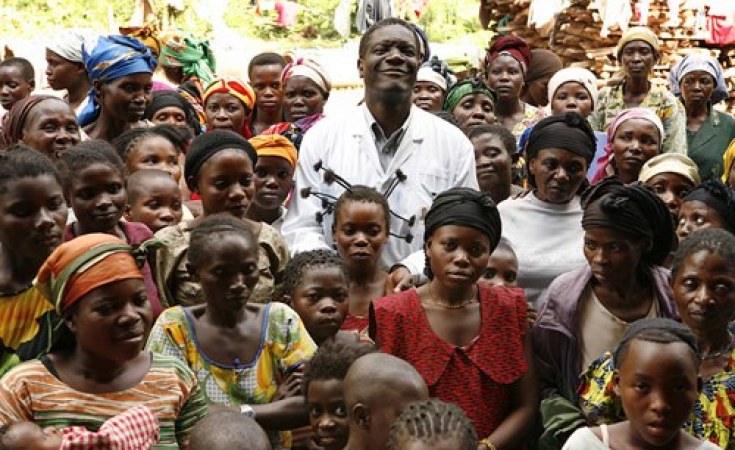Excerpts from the presentation speech delivered by Berit Reiss-Andersen, chair of the Norwegian Nobel Committee, at the award of the 2018 Nobel Peace Prize to Denis Mukwege of the DR Congo and Nadia Murad of Iraq for their work to end the use of sexual violence as a weapon of war and armed conflict.
The war waged in the Democratic Republic of the Congo since 1997 has cost the lives of almost six million Congolese. Physician Denis Mukwege saw among his patients a growing number of women with severe injuries caused by rape and gross violence.
Soldiers from all sides of the conflict have attacked young women. They have attacked old women. And they have attacked children. The point is to injure them and degrade them, but also to destabilise and demoralise the community in which they live. Gross sexual violence hurts the victim, hurts her family, and hurts her entire village and the larger community. A woman who has been raped by a group of 30 soldiers cannot simply put the experience behind her and continue her life as before.
As a doctor, Denis Mukwege saw these women and the fact that they lacked health care and social support. He founded Panzi Hospital to meet the needs of the thousands of women victimised by these war crimes. Today he is one of the world’s foremost surgeons specialising in the repair of physical injuries caused by brutal, devastating rapes.
However, Panzi Hospital also provides trauma treatment and programmes to reintegrate women into society. As a result of the sexual assaults, many of the women have lost their families and the support of their local communities. Without the efforts of Denis Mukwege and his staff at Panzi Hospital, these women would have been alone to fend for themselves.
Denis Mukwege has helped these women as a physician, but he has also been a fervent advocate of their cause and their human dignity. His mission has been to tell the world of this abuse, to demand acknowledgement of the victims’ suffering and to insist the perpetrators be held accountable.
Denis Mukwege has made enemies by unconditionally taking the victim’s side. He and his staff have endured threats, attempts on their lives and smear campaigns. In 2012, one of his bodyguards was killed in an attack targeting Dr. Mukwege and his family. For some people, defending the cause of women is clearly an intolerable offence.
Denis Mukwege, we thank you for seeing the suffering and devoting your life to the battle for women and against sexual violence...
Ladies and gentlemen, both Denis Mukwege and Nadia Murad have made significant contributions to combating this type of war crime by focusing attention on the suffering inflicted on women in Iraq, the Democratic Republic of the Congo and everywhere else in the world where sexual violence is used as a weapon. We must be aware of these crimes if we are to combat them. The war waged on women through the use of sexual violence has been a hidden war. When the time has come for peace negotiations and transitional justice, these crimes have rarely been on the agenda...
Denis Mukwege is spot on when he says: “Justice is everyone’s business.”
Denis Mukwege and Nadia Murad have both made significant efforts to advance this process [of advancing the cause of justice]. Both have been able to communicate the scale of the atrocities and to demand prosecution of all those responsible. They have thereby fulfilled key criteria in Alfred Nobel’s will. Their work is, in fact, a contribution to disarmament. Sexual violence is an intolerable weapon that cannot be accepted in warfare.
Their primary contribution, however, is to what Alfred Nobel called the “fraternity of nations”: they have shown us that human suffering in war is universal. They have pointed out that women are predominantly invisible victims of the horrors of war. Both laureates have demanded that injustice be combated with justice. War crimes must be punished, and the responsibility rests with the entire international community. Both of them are thus fully deserving of Alfred Nobel’s Peace Prize.
Ladies and gentlemen, this award obligates Denis Mukwege and Nadia Murad to continue their vital work. But the award also obligates us to stand side by side with them in the struggle to end wartime sexual violence. Only then can the hopeful message of Nadia’s autobiography The Last Girl come true. Together we must make her generation of young women and girls the last generation to suffer from the barbarism of sexual war crimes.
Copyright © The Nobel Foundation 2018


